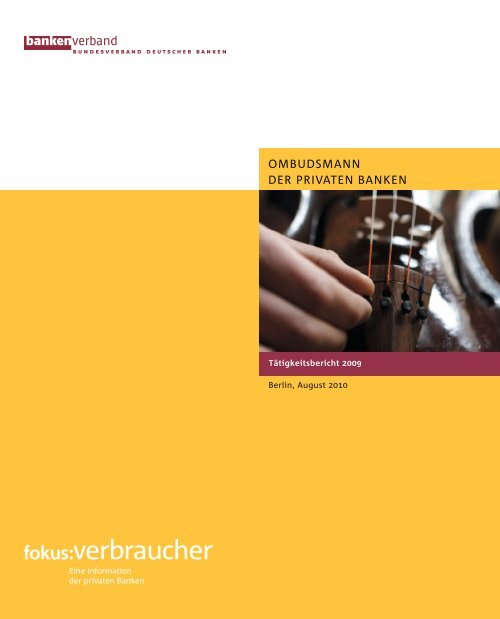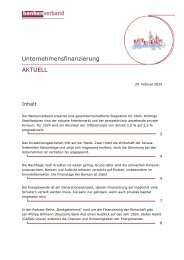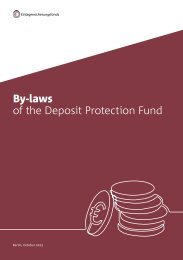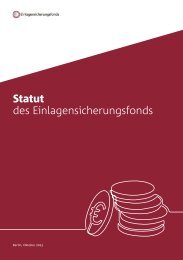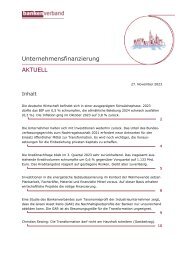Summary of the Ombudsman's Report 2009
To settle disputes between banks and their customers as quickly and smoothly as possible, Germany's private commercial banks introduced an out-of-court conciliation procedure as early as 1992.
To settle disputes between banks and their customers as quickly and smoothly as possible, Germany's private commercial banks introduced an out-of-court conciliation procedure as early as 1992.
Create successful ePaper yourself
Turn your PDF publications into a flip-book with our unique Google optimized e-Paper software.
Ombudsmann<br />
der privaten Banken<br />
Tätigkeitsbericht <strong>2009</strong><br />
Berlin, August 2010
106 ombudsmann der privaten banken – tätigkeitsbericht <strong>2009</strong><br />
7 <strong>Summary</strong> <strong>of</strong> <strong>the</strong> Ombudsman’s <strong>Report</strong> <strong>2009</strong><br />
To settle disputes between banks and <strong>the</strong>ir customers as<br />
quickly and smoothly as possible, Germany’s private commercial<br />
banks introduced an out-<strong>of</strong>-court conciliation procedure<br />
as early as 1992: <strong>the</strong> Ombudsman Scheme. The Ombudsman<br />
Scheme is <strong>the</strong> centrepiece <strong>of</strong> <strong>the</strong> private commercial banks’<br />
overall consumer policy scheme, which rests on four pillars:<br />
consumer education, consumer information, contract transparency<br />
and out-<strong>of</strong>-court dispute-resolution facilities.<br />
1. The Ombudsman Scheme<br />
under <strong>the</strong> statutory limitation period during <strong>the</strong> ombudsman<br />
proceedings. If <strong>the</strong>ir complaint to <strong>the</strong> ombudsman is upheld,<br />
<strong>the</strong>y obtain redress quickly and easily. The private commercial<br />
banks have undertaken to accept ombudsman decisions in<br />
disputes involving amounts up to €5,000. This binding effect<br />
<strong>of</strong> ombudsman decisions should not be taken for granted; it is<br />
not standard practice in dispute-resolution schemes operated<br />
by <strong>the</strong> business sector on a voluntary basis. Experience has<br />
shown that banks <strong>of</strong>ten accept ombudsman decisions against<br />
<strong>the</strong>m even where disputes involve amounts exceeding €5,000.<br />
a. Out-<strong>of</strong>-court dispute resolution<br />
As an alternative to <strong>the</strong> <strong>of</strong>ten inconvenient, time-consuming<br />
and expensive option <strong>of</strong> legal action, Germany’s private commercial<br />
banks <strong>of</strong>fer <strong>the</strong>ir customers a widely accepted, effective<br />
procedure whereby disputes are resolved unbureaucrati -<br />
c ally and quickly by an independent, impartial person – an<br />
ombudsman. The Ombudsman Scheme is designed primarily<br />
for consumers, but it is also open to firms and pr<strong>of</strong>essionals to<br />
handle disputes about credit transfers or misuse <strong>of</strong> payment<br />
cards. Details <strong>of</strong> how <strong>the</strong> scheme works are set out in <strong>the</strong> Rules<br />
<strong>of</strong> Procedure approved by <strong>the</strong> Federal Ministry <strong>of</strong> Justice for<br />
<strong>the</strong> settlement <strong>of</strong> customer complaints in <strong>the</strong> German private<br />
commercial banking sector, which are printed in <strong>the</strong> Appendix<br />
to <strong>the</strong> Ombudsman’s <strong>Report</strong>.<br />
The benefits <strong>of</strong> this modern dispute-resolution scheme are<br />
obvious: <strong>the</strong> scheme is free <strong>of</strong> charge to bank customers<br />
and does not involve any risks for <strong>the</strong>m. If <strong>the</strong>y do not accept<br />
<strong>the</strong> ombudsman’s decision, <strong>the</strong>y are still free to go to a<br />
court <strong>of</strong> law. They cannot lose out by forfeiting <strong>the</strong>ir claims<br />
b. The ombudsmen<br />
The high level <strong>of</strong> public acceptance that <strong>the</strong> private commercial<br />
banks’ Ombudsman Scheme enjoys is due, to a great<br />
extent, to <strong>the</strong> quality <strong>of</strong> <strong>the</strong> ombudsmen <strong>the</strong>mselves. These are<br />
former senior judges or legal pr<strong>of</strong>essionals whose personality<br />
and proven expertise ensure impartial proceedings:<br />
• Ekkehard Bombe, former judge at <strong>the</strong> Constitutional<br />
Court <strong>of</strong> Hesse and president <strong>of</strong> Wiesbaden Regional Court<br />
• Horst-Die<strong>the</strong>r Hensen, former vice-president <strong>of</strong> <strong>the</strong><br />
Hanseatic Higher Regional Court, Hamburg<br />
• Dr Gerda Müller, former vice-president and presiding<br />
judge at <strong>the</strong> Federal Supreme Court<br />
• Dr Gerhart Kreft, former presiding judge at <strong>the</strong> Federal<br />
Supreme Court<br />
• Werner Weiß, former senior justice ministry <strong>of</strong>ficial<br />
in Bavaria and presiding judge at <strong>the</strong> Munich Higher<br />
Regional Court.
ankenverband 107<br />
c. Management <strong>of</strong> complaints<br />
A Customer Complaints Office was set up at <strong>the</strong> Association <strong>of</strong><br />
German Banks as a gateway to <strong>the</strong> Ombudsman Scheme. Any<br />
customer <strong>of</strong> a private commercial bank can contact this <strong>of</strong>fice in<br />
writing if <strong>the</strong>y feel that <strong>the</strong>y have been treated unfairly by <strong>the</strong>ir<br />
bank. All <strong>the</strong>y have to do is give a brief account <strong>of</strong> <strong>the</strong> facts <strong>of</strong><br />
<strong>the</strong> matter, enclosing copies <strong>of</strong> <strong>the</strong> required documents (e.g.<br />
cash account or securities account statements). Complaints in<br />
English and French submitted by customers resident abroad<br />
are also processed; in this case, however, <strong>the</strong> ombudsman<br />
proceedings can take longer, as translations may be required.<br />
A fully intended consequence <strong>of</strong> <strong>the</strong> introduction <strong>of</strong> <strong>the</strong><br />
Ombudsman Scheme is that most private commercial banks<br />
have set up schemes <strong>of</strong> <strong>the</strong>ir own to handle customer complaints.<br />
These in-house complaint-settlement schemes have<br />
been a success. A large number <strong>of</strong> complaints do not need to<br />
be settled by an ombudsman. In many cases, simply explaining<br />
banking procedures or complex, abstract banking transactions<br />
takes care <strong>of</strong> any disputes in advance.
108 ombudsmann der privaten banken – tätigkeitsbericht <strong>2009</strong><br />
2. Statistics<br />
a. Number and outcome <strong>of</strong> complaints<br />
The failure <strong>of</strong> Lehman Bro<strong>the</strong>rs on 15 September 2008<br />
triggered a rise in <strong>the</strong> number <strong>of</strong> complaints from <strong>the</strong> fourth<br />
quarter <strong>of</strong> 2008 onwards, which continued throughout <strong>2009</strong>.<br />
At <strong>the</strong> end <strong>of</strong> <strong>the</strong> year, <strong>the</strong> number <strong>of</strong> complaints received<br />
totalled over 6,500. This was an increase <strong>of</strong> around 35% compared<br />
with 2008.<br />
In addition, around 2,400 complaints against non-members<br />
were received during this period and forwarded to <strong>the</strong> relevant<br />
dispute-settlement bodies.<br />
As <strong>the</strong> above table shows, 1,005 complaints in <strong>2009</strong> were not<br />
followed up by <strong>the</strong> complainants and thus did not require an<br />
ombudsman decision. Over 800 <strong>of</strong> <strong>the</strong> complaints received<br />
in <strong>2009</strong> were inadmissible under <strong>the</strong> Ombudsman Scheme.<br />
In some <strong>of</strong> <strong>the</strong>se cases, <strong>the</strong> complainants were not, for example,<br />
consumers or not <strong>the</strong>mselves customers <strong>of</strong> <strong>the</strong> bank<br />
concerned. Such cases involved, for instance, complaints by<br />
customers that money remitted by <strong>the</strong>m was credited to a<br />
different account at <strong>the</strong> payee bank than that specified in <strong>the</strong>ir<br />
instructions. In accordance with Section 4 (4) sentence 3 <strong>of</strong> <strong>the</strong><br />
Rules <strong>of</strong> Procedure for <strong>the</strong> Ombudsman Scheme, ombudsmen<br />
proceedings were not possible in over 500 <strong>of</strong> <strong>the</strong> inadmissible<br />
cases as evidence could not be provided through <strong>the</strong> presentation<br />
<strong>of</strong> documents, and <strong>the</strong> hearing <strong>of</strong> witnesses would have<br />
been necessary to settle <strong>the</strong> complaint.<br />
Taking into account all <strong>the</strong> cases already closed, just about<br />
60% <strong>of</strong> <strong>the</strong> complaints admissible under <strong>the</strong> Ombudsman<br />
Scheme were resolved in favour <strong>of</strong> customers or settled on<br />
an amicable basis. Often simply explaining banking procedures<br />
or complex, abstract banking transactions resolve disputes<br />
in advance.<br />
Where banks examined a customer’s complaint internally and<br />
found it to be legitimate, <strong>the</strong>y <strong>of</strong>ten provided redress without<br />
referring <strong>the</strong> complaint to <strong>the</strong> Ombudsman Scheme. Banks<br />
also settled some <strong>of</strong> <strong>the</strong>se complaints on a goodwill basis. In<br />
169 cases, <strong>the</strong> ombudsman proposed a compromise agreement<br />
between <strong>the</strong> parties to settle <strong>the</strong> complaint. Just under<br />
40% <strong>of</strong> <strong>the</strong> admissible complaints were settled in favour <strong>of</strong><br />
banks.<br />
Since almost 1,000 complaints were still being processed when<br />
<strong>the</strong> Ombudsman’s <strong>Report</strong> <strong>2009</strong> was published, a marked shift<br />
in <strong>the</strong> outcome <strong>of</strong> complaints in favour <strong>of</strong> customers is currently<br />
indicated. The outcome <strong>of</strong> complaints has been relatively<br />
evenly balanced during <strong>the</strong> past five years, how ever, with usually<br />
just over 50% <strong>of</strong> complaints being resolved in favour <strong>of</strong><br />
customers. Once all <strong>the</strong> outstanding complaints have been<br />
dealt with, it is <strong>the</strong>refore likely that <strong>the</strong> present figure will be<br />
much <strong>the</strong> same.
ankenverband 109<br />
Overview <strong>of</strong> number and outcome <strong>of</strong> complaints received annually: 2005–<strong>2009</strong><br />
Area 2005 2006 2007 2008 <strong>2009</strong><br />
Total number <strong>of</strong> complaints 2,791 3,753 3,610 4,837 6,514<br />
Complaints not followed up by customer 457 607 617 744 1,005<br />
Inadmissible/unsuitable complaints (1) 718 598 385 734 827<br />
Admissible complaints 1,616 2,548 2,608 3,359 2) 4,682 3)<br />
Complaints resolved in favour <strong>of</strong> customer (also partly) 851 1,423 1,403 1,792 2,076<br />
Compromise proposed by ombudsman 43 51 68 88 169<br />
Complaints resolved in favour <strong>of</strong> bank 722 1,074 1,137 1,436 1,465<br />
Source: Association <strong>of</strong> German Banks, 30 June 2010.<br />
1) Admissible complaints under <strong>the</strong> Rules <strong>of</strong> Procedure which <strong>the</strong> ombudsman never<strong>the</strong>less declines to resolve as fur<strong>the</strong>r evidence-taking would be necessary.<br />
2) Of <strong>the</strong> 3,359 admissible complaints, 43 are still being processed.<br />
3) Of <strong>the</strong> 4,682 admissible complaints, 972 are still being processed.
110 ombudsmann der privaten banken – tätigkeitsbericht <strong>2009</strong><br />
b. Breakdown <strong>of</strong> complaints by subject matter<br />
Depending on <strong>the</strong>ir main focus, <strong>the</strong> complaints received by<br />
<strong>the</strong> Customer Complaints Office are assigned for statistical<br />
purposes to one <strong>of</strong> <strong>the</strong> following areas:<br />
• Securities business<br />
• Lending business<br />
• Payments business<br />
• Basic account<br />
• Guarantees/third-party security<br />
• Savings business<br />
• Miscellaneous<br />
The complaints made by consumers reflect all aspects <strong>of</strong><br />
banking business. The following table contains a five-year<br />
comparison <strong>of</strong> <strong>the</strong> trend in complaints, broken down into<br />
in dividual lines <strong>of</strong> business. This breakdown provides an<br />
overview <strong>of</strong> <strong>the</strong> main focus <strong>of</strong> <strong>the</strong> complaints received by <strong>the</strong><br />
Association <strong>of</strong> German Banks in <strong>2009</strong>.<br />
As in 2008, <strong>the</strong> number <strong>of</strong> complaints relating to securities<br />
business increased strongly, and now accounts for nearly half<br />
<strong>of</strong> all complaints received. All o<strong>the</strong>r lines <strong>of</strong> business also recorded<br />
an increase in <strong>the</strong> number <strong>of</strong> complaints.
ankenverband 111<br />
Complaint areas 2005–<strong>2009</strong><br />
Area 2005 2006 2007 2008 <strong>2009</strong><br />
Securities business 681 725 796 1,867 3,105<br />
in % 24.4 19.3 22.0 38.6 47.7<br />
Lending business 1,026 1,006 898 1,000 1,072<br />
in % 36.8 26.8 24.9 20.7 16.5<br />
Payments business 644 1,234 1,172 1,252 1,517<br />
in % 23.1 32.9 32.5 25.9 23.3<br />
Basic account 170 431 386 354 358<br />
in % 6.0 11.5 10.7 7.3 5.5<br />
Savings business 243 300 272 254 348<br />
in % 8.7 8.0 7.5 5.3 5.3<br />
Guarantees/third-party security 19 19 18 11 11<br />
in % 0.7 0.5 0.5 0.2 0.2<br />
Miscellaneous 8 38 68 99 103<br />
in % 0.3 1.0 1.9 2.0 1.5<br />
Total 2,791 3,753 3,610 4,837 6,514<br />
Source: Association <strong>of</strong> German Banks, 30 June 2010.
112 ombudsmann der privaten banken – tätigkeitsbericht <strong>2009</strong><br />
Because <strong>of</strong> <strong>the</strong> global stock market slump, <strong>the</strong> financial crisis<br />
was reflected in ombudsman proceedings primarily in <strong>the</strong> field<br />
<strong>of</strong> securities business. The chart shows that most complaints<br />
in this area – around 77% – concerned investment advice.<br />
In 2008, 1,324 complaints about investment advice were<br />
re ceived; in <strong>2009</strong>, on <strong>the</strong> o<strong>the</strong>r hand, <strong>the</strong> figure was 2,404,<br />
almost twice as many.<br />
Complaints relating to securities business<br />
in <strong>2009</strong><br />
Portfolio management<br />
Settlement<br />
274 427<br />
One-third <strong>of</strong> <strong>the</strong>se complaints were related to <strong>the</strong> sale <strong>of</strong><br />
various Lehman Bro<strong>the</strong>rs certificates. Customers complained,<br />
for example, that <strong>the</strong>y were not made aware <strong>of</strong> <strong>the</strong> potential<br />
issuer risk involved or that <strong>the</strong> certificates did not fit <strong>the</strong>ir<br />
personal risk pr<strong>of</strong>ile. Although <strong>the</strong> number <strong>of</strong> complaints<br />
concerning Lehman Bro<strong>the</strong>rs certificates was not particularly<br />
high, <strong>the</strong> failure <strong>of</strong> this investment bank led to a significant<br />
decline in <strong>the</strong> value <strong>of</strong> investments last year. The bad performance<br />
<strong>of</strong> <strong>the</strong>ir investments and <strong>the</strong> resulting losses were<br />
fur<strong>the</strong>r grounds in many cases for customers to turn to <strong>the</strong><br />
ombudsman. Customers <strong>of</strong>ten complained that <strong>the</strong>y were not<br />
advised properly by <strong>the</strong>ir bank when purchasing securities<br />
and that, contrary to what <strong>the</strong>y originally intended, <strong>the</strong>y were<br />
instead encouraged to make risky investments, or that <strong>the</strong><br />
specific risks attached to a security <strong>the</strong>y purchased were not<br />
explained fully to <strong>the</strong>m. In some cases, customers sought to<br />
make <strong>the</strong> bank liable for <strong>the</strong> losses <strong>the</strong>y incurred without,<br />
however, being able to show that <strong>the</strong>y had any legal claim to<br />
compensation. Such complaints usually do not resolve <strong>the</strong>mselves<br />
beforehand, so that <strong>the</strong> ombudsman has to make a<br />
decision every time.<br />
2,404<br />
Investment advice/asset management<br />
Source: Association <strong>of</strong> German Banks, 30 June 2010.
ankenverband 113<br />
Complaints relating to lending business<br />
in <strong>2009</strong><br />
Consumer loans<br />
Lending business accounted for a total <strong>of</strong> 1,072 complaints in<br />
<strong>2009</strong>, an increase <strong>of</strong> around 4% compared with <strong>the</strong> figure for<br />
<strong>the</strong> previous year (1,000).<br />
681<br />
391<br />
In <strong>the</strong> case <strong>of</strong> mortgage loans, <strong>the</strong>re were still several complaints<br />
in <strong>2009</strong> about <strong>the</strong> charging <strong>of</strong> property valuation fees.<br />
These complaints, filed on <strong>the</strong> strength <strong>of</strong> <strong>the</strong> ruling by <strong>the</strong><br />
Stuttgart Regional Court in April 2007, centred on <strong>the</strong> question<br />
<strong>of</strong> who has to pay <strong>the</strong> cost <strong>of</strong> a valuation made prior to a loan.<br />
The ombudsman refrained from taking any action in many<br />
cases, as banks were usually able to successfully invoke <strong>the</strong><br />
statute <strong>of</strong> limitations.<br />
Mortgage loans<br />
Although <strong>the</strong> way banks calculate <strong>the</strong> early repayment penalty<br />
has been clarified by <strong>the</strong> Federal Court <strong>of</strong> Justice, complaints<br />
were received – as in previous years – about <strong>the</strong> size <strong>of</strong> <strong>the</strong><br />
fee charged for repaying a loan early. Penalties were <strong>the</strong>refore<br />
only questioned by <strong>the</strong> ombudsman, and banks asked to<br />
recalculate <strong>the</strong>se, in a small number <strong>of</strong> cases.<br />
Source: Association <strong>of</strong> German Banks, 30 June 2010.<br />
Both in mortgage lending and consumer lending business,<br />
difficulties in repaying loans played a not insignificant role in<br />
<strong>2009</strong>. Most complaints in this field were filed by customers in<br />
<strong>the</strong> hope that <strong>the</strong>ir bank would accommodate <strong>the</strong>m under<br />
ombudsman proceedings. As, however, business-policy<br />
decisions by banks are involved here, <strong>the</strong> ombudsman cannot<br />
make any decision in <strong>the</strong>se cases.<br />
In quite a large number <strong>of</strong> cases, complaints concerned <strong>the</strong><br />
new loan terms <strong>of</strong>fered by a bank once a fixed-interest period<br />
expired. In a few cases, complaints were also received about
114 ombudsmann der privaten banken – tätigkeitsbericht <strong>2009</strong><br />
Complaints relating to payments business<br />
in <strong>2009</strong><br />
bank financing to purchase a property because <strong>the</strong> market<br />
value <strong>of</strong> <strong>the</strong> property was seen to be too high.<br />
Card-based<br />
253<br />
Non-card-based<br />
275<br />
In consumer lending business, complaints also <strong>of</strong>ten centred<br />
on whe<strong>the</strong>r loan interest rates were appropriate and on <strong>the</strong><br />
way banks adjusted variable interest rates. Along with <strong>the</strong><br />
question <strong>of</strong> whe<strong>the</strong>r a bank was actually allowed to terminate<br />
a loan in <strong>the</strong> first place, <strong>the</strong> fact that it reported termination<br />
<strong>of</strong> <strong>the</strong> loan to SCHUFA (Germany’s largest credit reference<br />
agency) also gave rise to complaints in many cases.<br />
989<br />
In payments business, 65% <strong>of</strong> complaints concerned problems<br />
in connection with account management, including opening<br />
and closing accounts. The remainder were related to conventional<br />
payments, especially card transactions (17%) and credit<br />
transfers (18%).<br />
Account management<br />
Source: Association <strong>of</strong> German Banks, 30 June 2010.<br />
In <strong>2009</strong>, card-based payments gave rise to 253 complaints.<br />
Besides <strong>the</strong> allegedly unjustified deduction <strong>of</strong> fees and <strong>the</strong><br />
size <strong>of</strong> withdrawals made at ATMs, a fur<strong>the</strong>r focus <strong>of</strong> <strong>the</strong>se<br />
complaints was <strong>the</strong> question <strong>of</strong> liability for fraudulent use<br />
<strong>of</strong> payment cards. A total <strong>of</strong> 275 cases were referred to <strong>the</strong><br />
ombudsman because <strong>the</strong> bank deducted credit transfer fees<br />
that <strong>the</strong> customer considered unjustified, or executed credit<br />
transfers wrongly or failed to execute credit transfers at all. In<br />
some cases, customers complained about fees charged for an<br />
account <strong>the</strong>y no longer used and, in o<strong>the</strong>rs, about <strong>the</strong> closure<br />
<strong>of</strong> an account.
ankenverband 115<br />
3. Recognition <strong>of</strong> <strong>the</strong><br />
Ombudsman Scheme<br />
The German private commercial banks’ Ombudsman Scheme<br />
is widely recognised – not only by customers and banks, but<br />
also by government bodies at national and European level:<br />
In <strong>the</strong> case <strong>of</strong> disputes between customers and private<br />
commercial banks relating to credit transfer law and misuse<br />
<strong>of</strong> payment cards, <strong>the</strong> ombudsman replaces <strong>the</strong> conciliation<br />
body set up at <strong>the</strong> Deutsche Bundesbank under <strong>the</strong> German<br />
Prohibitory Injunctions Act. The Federal Ministry <strong>of</strong> Justice has<br />
entrusted <strong>the</strong> Ombudsman Scheme with <strong>the</strong> public disputeresolution<br />
function in this field for <strong>the</strong> private commercial<br />
banks.<br />
In <strong>the</strong> case <strong>of</strong> disputes between consumers and foreign<br />
financial services undertakings, <strong>the</strong> Customer Complaints<br />
Office helps to find <strong>the</strong> appropriate complaints <strong>of</strong>fice abroad.<br />
The German private commercial banks’ Ombudsman Scheme<br />
supports <strong>the</strong> Consumer Complaints Network for Financial<br />
Services (FIN-NET), set up by <strong>the</strong> European Commission,<br />
which links up recognised dispute-resolution schemes in <strong>the</strong><br />
European financial services sector.<br />
4. Conclusion<br />
The global financial crisis poses a particular challenge to banks<br />
as well as <strong>the</strong> Ombudsman Scheme in <strong>the</strong> year ahead. Banks<br />
<strong>the</strong>mselves must make a major contribution towards restoring<br />
investor confidence lost as a result <strong>of</strong> <strong>the</strong> crisis.<br />
The Association <strong>of</strong> German Banks has taken up this challenge<br />
by launching a number <strong>of</strong> measures in <strong>the</strong> field <strong>of</strong> consumer<br />
protection, particularly in relation to investment advice. For<br />
example, in May <strong>2009</strong> it published “Guidelines for streng<strong>the</strong>ning<br />
investor confidence in retail banking”. In March 2010, it<br />
presented a model product information sheet designed to<br />
improve transparency and comparability by providing a brief<br />
and concise description <strong>of</strong> an investment product. In doing<br />
so, it was not only following up ideas tabled by <strong>the</strong> Federal<br />
Ministry for Nutrition, Agriculture and Consumer Protection,
116 ombudsmann der privaten banken – tätigkeitsbericht <strong>2009</strong><br />
but also taking into account future European Commission requirements.<br />
In addition, <strong>the</strong> Association played a constructive<br />
role in introducing <strong>the</strong> written record <strong>of</strong> investment advice<br />
that banks have been required to provide to customers since<br />
January 2010.<br />
The financial crisis naturally also had a significant impact on<br />
<strong>the</strong> work <strong>of</strong> <strong>the</strong> private commercial banks’ ombudsmen dur ing<br />
<strong>the</strong> year under review. The number <strong>of</strong> complaints rose sharply<br />
in <strong>the</strong> final quarter <strong>of</strong> 2008, shortly after <strong>the</strong> collapse <strong>of</strong> Lehman<br />
Bro<strong>the</strong>rs. This trend continued throughout <strong>2009</strong>, leading<br />
to <strong>the</strong> largest number <strong>of</strong> complaints handled by <strong>the</strong> Ombudsman<br />
Scheme since its inception. By far <strong>the</strong> most com plaints<br />
concerned investment advice. Here, <strong>the</strong> ombudsman has to<br />
decide objectively and unemotionally whe<strong>the</strong>r a financial loss<br />
incurred by a customer in an individual case was due to wrong<br />
advice provided by <strong>the</strong> bank. As an independent third party,<br />
<strong>the</strong> ombudsman has to consider <strong>the</strong> facts <strong>of</strong> <strong>the</strong> case presented<br />
by both parties impartially, and assess <strong>the</strong> arguments<br />
from a legal standpoint. This is <strong>the</strong> basis for <strong>the</strong> ombudsman’s<br />
decision. Re-examination <strong>of</strong> <strong>the</strong> dispute in <strong>the</strong> ombudsman<br />
proceedings helps each party to better understand <strong>the</strong> o<strong>the</strong>r’s<br />
arguments and <strong>of</strong>fers <strong>the</strong> chance to renew <strong>the</strong> relationship <strong>of</strong><br />
trust between <strong>the</strong>m through <strong>the</strong> services <strong>of</strong> <strong>the</strong> ombudsman<br />
as an independent third party.


